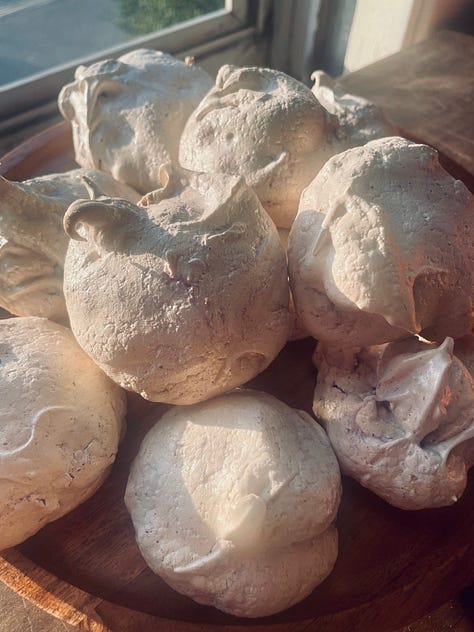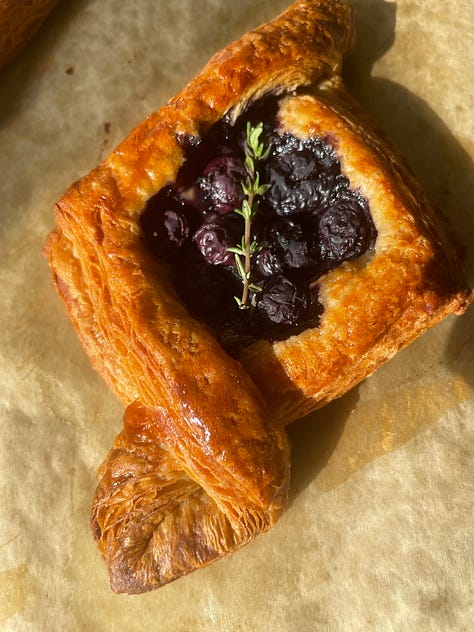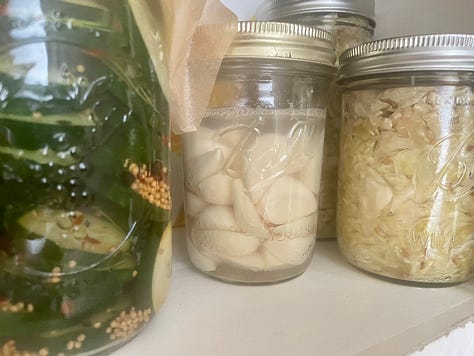


I do most of my thinking at work, when I’m standing at the laminator, progressively stretching out and making thinner croissant dough, or at my adjacent workstation, rolling triangles of croissant dough into their crescent shapes, slicing bars of chocolate into batons for pain au chocolat, carefully cutting kite-shaped Danish pastries. This is not to say that this is mindless work. It requires meticulous attentiveness to detail, even as the processes have become ingrained in my brain and hands (I’ve learned my lesson about being too deeply lost in thought while sheeting — and then accidentally destroying — croissant dough). Yet, this is also quiet work. I’m most often alone when doing it, in a bakery spatially organized in such a way that I work with my back turned to the activities and chatter of my bread-making coworkers as they shape sandwich loaves, boules, and bâtards.
Coming into the profession of baking is secondary for me. I went to a college-preparatory high school where doing anything other than attending a four-year university after high school was hardly made to seem an option. I happily went on to study English and French, and a little bit later completed a master’s degree in Library & Information Studies, all in the pursuit of the supposed comfort of the 9-to-5.
It was in grad school, in a tiny, but sunny, efficiency apartment (my closet doubled as my pantry), that I really began to push the bounds of my cooking and baking. I would wake up early on Sundays, stumble the 10 steps or so from my bed to the kitchen area to check on the fermentation process of the bread dough I’d mixed the night before, preheat the oven and place my Dutch oven inside, preparing to bake my weekly loaf of bread. Then I’d start on making some sort of sweet treat for snacking on throughout the week: Madeleines with brown butter, cardamom, plums; tarts, galettes, and hand pies with seasonal fruit, like ground cherries and berries. I often felt adrift in and disconnected from my master’s program; cooking and baking gave me the creative outlet that I was left wanting in my professional degree program, and it was in the kitchen where I felt I could more truly express myself. .
I connected with other grad students, some in my cohort, some in PhD programs, over the joys of cooking, and of cooking sometimes complex and extravagant things. It gave me pause to think about the shifting of our concentrations from the cerebral work of studying to the manual work of preparing a meal. I came to know cooking as a balm from the labors of the day; using my hands to prepare something nourishing and enjoyable was a respite from managing a repository of datasets and manuscripts, from discussions about best practices in archiving.
When I made the jump to work in a bakery, it surprised some people. Why would I have earned multiple academic degrees to work in a physically demanding job, to presumably “not use my degrees” (as if my quote-unquote email job was the best reflection of the time and money I’d invested in higher education)? And yet, every day, managing the myriad variables implicit in sourdough baking makes my work seem not so distant from the research work I left. Every day at work is intellectually engaging: we think and talk about the weather in relation to how the sourdough starter behaves; discussions about our locally grown and milled flours often touch on rainfall and climate change topics; so much of what we do and talk about doing in the future has, at its heart, the priority of supporting and working within a local food system.
This makes me question the assumption that manual labor does not have a thinking, intellectual aspect, or even a potential. Of course, I see this rooted in a hierarchical classism that organizes manual labor at a lower rung than thought work; our society’s ontology of class and professionalism does not view these things as being complementary, but rather, as disparate forms of work altogether. To unite thoughtfulness with the manual work that helps to keep a society functioning is to ask for a slowing down, a distancing from capitalist ideals of fast, exponential growth and industrialized methods, and instead to do things within a community, for a community. It suggests that breaking down the barriers between categories of labor has liberatory potential.
Uniting these activities is also to remix them, to make them work for ourselves, in new, hopefully better, ways. Legacy Russell writes in Glitch Feminism:
“Queer people, people of color, and female-identifying people have an enduring and historical relationship to the notion of ‘remix.’….Remixing is an act of self-determination; it is a technology of survival.”
A couple of weeks ago, I wrote about the radical potential of fermentation. Fermentation can be a source of creativity within a community, within a food system. How can we work towards building a more enriching world without uniting the efforts of our bodies and our minds? How can we refute, or glitch, the capitalist social design that wants us to dichotomize thought and action?
There, too, is the ingrained idea that our identities, our places in the world, are fixed. How can we possibly be bakers, and readers, and writers — all at once? There is something so unnatural and limiting in the line of thought that we can maybe be one thing, but not another. In fact, maybe these things are more alike than we’ve been conditioned to think. In Bake Sense, Sarah Lemanski wrote of writing and baking:
“I know reading and hearing the words of others and feeling and thinking as those words and that voice move through me are essential parts of my day. They need not be ordained as articulate, grand, scholarly or sophisticated. They need to be human. Their effect on me can bring focus, calm, inspiration and reassurance. My baking practice brings about the same things. Words are the bread and the biscuits baked up in the oven of my mind.”
Every day, I am grateful that I’m currently able to marry baking with reading and writing, that I have the time and energy to sit down and write about the thoughts that percolate in my brain when I’m at work. For me, these are all things that give me energy in different ways, seeming to work synergistically to do so, and to help me learn ever-increasingly more about myself and the world. Though it’s been memed to eye-rolling triteness, we do contain multitudes. I only wish that the opportunities for us all to engage with those potentialities and to remix what we have were more universally abundant and clear.




I just finished Abolish the Family, which touches on the history of radicals who imagined more collective ways of life such as homes that do not have individual kitchens. There is no one "right" alternative way, of course, but the shift from doing the labor of baking in your privatized home to the social workplace is interesting and I think, an important distinction from the many "influencers" who focus on their perfect, privatized, enormous kitchens.
You’re such a talented writer! Love the ideas you’ve expressed here.